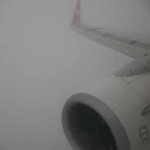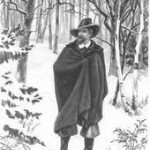 A parishioner walked up to me after a recent Sunday meeting and gushed, “I wish I had half as much faith as you!” I laughed in his face. Quickly I tried to explain that while I may serve as a pastor my faith is as rickety as doubting Thomas’. Like so many, I find it challenging to maintain any level of real trust in God, in the church, or in my own decision to follow Christ. Living in this insane asylum we call planet Earth is enough to grind the truest believer into the dust, no? So how do we do it? How do we keep the faith when it is sometimes so hard to believe? There is so much we cannot be certain of; so few things we actually control; so little that can be proven. Is following Christ and believing in God nothing more than Pascal’s wager – a bet that the life we have chosen is true? Well, yes.
A parishioner walked up to me after a recent Sunday meeting and gushed, “I wish I had half as much faith as you!” I laughed in his face. Quickly I tried to explain that while I may serve as a pastor my faith is as rickety as doubting Thomas’. Like so many, I find it challenging to maintain any level of real trust in God, in the church, or in my own decision to follow Christ. Living in this insane asylum we call planet Earth is enough to grind the truest believer into the dust, no? So how do we do it? How do we keep the faith when it is sometimes so hard to believe? There is so much we cannot be certain of; so few things we actually control; so little that can be proven. Is following Christ and believing in God nothing more than Pascal’s wager – a bet that the life we have chosen is true? Well, yes.
Largely, faith is not a foolish, misplaced emotion. It is a decision. We believe because we have chosen to believe. We will never understand all there is about Christian spirituality, about following Jesus, or how faith is best expressed in the world. But we do not have to understand it all. For in believing, we begin the life-long, eternity-long journey toward understanding. As we seize with faith the day that is before us, God opens our eyes to His reality, to see what actually is. Often we get caught with the cart in front of the horse. We want to understand, first. We want certainty. We want iron-clad answers and assurances. Those things may come to you – they may not. But the way of Christ does not begin with confidence and move toward faith. It begins with faith and moves toward confidence.
A few years ago I returned toAtlanta,Georgia, fromWashingtonDC. It was a cold, stormy night. My flight had escaped Reagan National Airport just before a blizzard shut down the Eastern seaboard. But escape from the nation’s capitol was not an escape from trepidation. The homeward flight was swallowed with clouds as thick as bricks. The cloud cover was so dense that as we entered our holding pattern over Atlanta, I could not even see the lights below – not a single light, not a single landmark. The seatbelt was so tight around my waist that my kidneys were screaming “uncle.” As we circled and circled, lurched and jerked, accelerated and dropped, I dug my fingernails deeper and deeper into the arm rests.
Then, without warning, I felt the hardened thud of striking the runway. Safe and sound we coasted to the terminal. Incredibly, the pilot had landed the plane, not only in the dead of night, but in zero visibility. As I disembarked from the plane the pilot was standing at the door – sort of like the preacher at the end of Sunday worship – shaking hands, thanking us for our patronage and wishing us a fine evening. I stopped, and pointing out the window asked him, “How did you land this plane in that?” He answered, “It was no sweat. I just trust the instruments.”
See, if this pilot had tried to feel his way towardAtlanta, using his senses for some glimpse of certainly, we would have never made it home. We would have missed the city completely or worse, have attempted a landing on Interstate 85 somewhere. To fail to trust the instruments – pointing us along on the journey – would have been a disaster. Most times we can’t see what waits for us on our way home. The clouds are too thick; the view too obscured. We can’t even see where our next footstep will land. But in the absence of certainty, we reach forward in faith. God has placed the occasional marker as he speaks to us through his instruments – the Scriptures, in prayer, through the wisdom of those around us – and we trust those instruments to point us in the right direction.
The pilot who answered me so confidently as I left the plane that evening was skilled at hiding his fear. But he could not hide the circles of sweat that bled through the underarms of his coat. Still, sweating bullets or not, his trust in the instruments had gotten us home. It always will.

